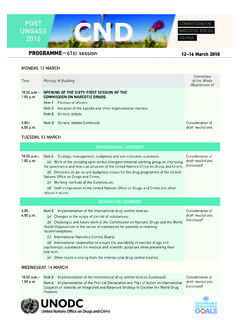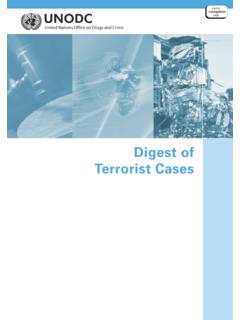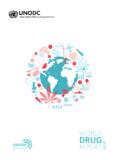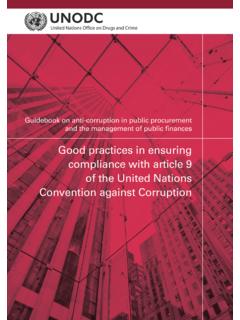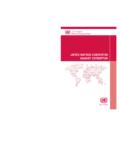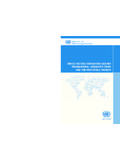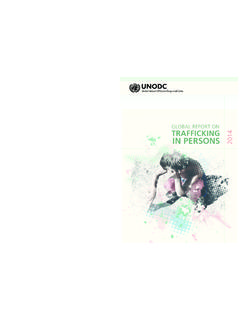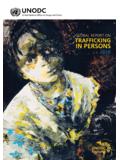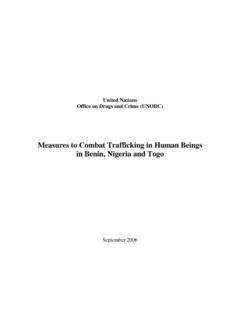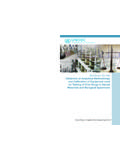Transcription of COVID-19 VACCINES AND CORRUPTION RISKS: PREVENTING ...
1 1 Credits: iStockphoto/MarsBarsCOVID-19 VACCINES AND CORRUPTION RISKS: PREVENTING CORRUPTION IN THE MANUFACTURE, ALLOCATION AND DISTRIBUTION OF VACCINESBACKGROUNDThe world health organization (WHO) declared the outbreak of a new coronavirus SARS-CoV-2 ( COVID-19 ) a pandemic on 11 March 2020. Since then, the pandemic continues to rage, and morbidity and mortality rates continue to climb globally. This illuminates the urgency of developing and ensuring access to affordable, safe and efficacious VACCINES , and their rapid and fair deployment. The positive results announced by a number of vaccine candidates in November 2020 have led to VACCINES being approved at record speed in different parts of the critical response will be required by governments to ensure access of their populations to safe and effective COVID-19 VACCINES .
2 Many governments have indicated that they aim to set up COVID-19 vaccine programmes that will cover their entire populations. The scale and complexity of the allocation, distribution and prioritization of the VACCINES will therefore be COVID-19 VACCINES being approved for use in different parts of the globe, the scale and complexity of their manufacture, allocation and distribution globally will be unprecedented. This will also present CORRUPTION risks that may threaten vital public health goals. These risks include the entry of substandard and falsified VACCINES into markets, theft of VACCINES within the distribution systems, leakages in emergency funding designated for the development and distribution of VACCINES , nepotism, favouritism, and corrupted procurement systems.
3 These CORRUPTION risks must be identified and mitigated by public institutions to help advance access to safe and effective COVID-19 VACCINES by the population, including the most vulnerable and marginalized groups. The United Nations Convention against CORRUPTION provides a solid global framework for these : iStockphoto/4X-imageWHO has activated the R&D Blueprint, a global strategy and preparedness plan to allow for the fast activation of research and development activities during epidemics. It aims to accelerate diagnostics, VACCINES and therapeutics for COVID-19 by improving coordination between scientists and global health professionals, accelerating the research and vaccination development process, and establishing new norms and standards to learn from and improve upon the global Furthermore, the WHO secretariat has reviewed and published a list of existing WHO guidance documents that are relevant to the development, production and evaluation of COVID-19 VACCINES .
4 The listing explains how current WHO standards may provide useful guidance and information for the development, production and evaluation of candidate COVID-19 A vaccine for COVID-19 should be viewed as a global public good. For this reason, public institutions should identify and address any potential gaps and barriers, such as the risk of CORRUPTION in distribution and allocation processes, to ensure that populations have equitable access to VACCINES . Addressing CORRUPTION is a priority in times of crisis. This notion was reinforced in the Statement on CORRUPTION in the Context of COVID-193 issued by the Secretary-General in October 2020 when Ant nio Guterres underscored that, ( CORRUPTION ) is even more damaging in times of crisis as the world is experiencing now with the COVID-19 pandemic.
5 He also noted that the pandemic is creating new opportunities for world health organization , R&D Blueprint and COVID-19 (2020). world health organization , Standardization of VACCINES for coronavirus disease ( COVID-19 ) (2020). 3 United Nations Secretary-General, Statement on CORRUPTION in the context of COVID-19 (2020). world health organization , Draft landscape of COVID-19 candidate VACCINES (2020). Burki, Thalha, A new paradigm for drug development. The Lancet, Digital health , vol. 2, Issue 5, support public institutions in times of crisis, this policy paper identifies potential CORRUPTION risks related to the deployment of a COVID-19 vaccine and how these risks may be mitigated.
6 The United Nations Convention against CORRUPTION provides a solid global framework for these efforts. CORRUPTION RISKSThe race to develop a COVID-19 vaccineThe urgency of developing a vaccine, therapeutics and diagnostics for COVID-19 has resulted in substantial public and private investment into its research and development. A tremendous amount of this activity has been directed at discovering a safe and efficacious COVID-19 vaccine at the global level. WHO is tracking the large number of vaccine candidates undergoing clinical trials on humans and preclinical VACCINES being investigated on research and development is a time-consuming and costly process that can take up to a decade to complete under normal circumstances and with no guaranteed In the current emergency situation, processes have been fast-tracked and several vaccine candidates are showing good results based on clinical trials, with the first ones having already been approved for public use and others in the final stages of receiving the green.
7 IStockphoto/IndypendenZThe research and development process includes many steps, such as the early research phase, the patent application, the preclinical testing phase, three phases of clinical trials, and the registration process. Shortcuts in any of these steps can result in significant health risks, as well as a loss of public confidence in the benefits of a vaccine. There are ample examples of how the research and development processes are being sped up for the COVID-19 vaccine development. Governments are also issuing licences, or planning to do so, for emergency use, including applying Emergency Use Listing of the The fast pace of research and development and the urgent demand for a vaccine may create opportunities for CORRUPTION that are likely to impede public health efforts.
8 Conflicts of interest8 related to the funding of the research and development of a COVID-19 vaccine is such a CORRUPTION risk. An example of this could be when a high-level officer of a government s COVID-19 vaccine research and development programme, who used to work for a private vaccine company that is bidding for a large contract under the government programme to manufacture a vaccine candidate, participates in a decision-making process on that countries have created special commissions to negotiate the purchase of COVID-19 VACCINES with the laboratories and universities conducting research and development on potential vaccine candidates.
9 There can be a lack of transparency, and thus a potential risk of CORRUPTION in what these agreements entail. These laboratories and universities 7 world health organization Emergency Use Listing Procedure is a risk-based procedure for assessing and listing unlicensed VACCINES , therapeutics and in vitro diagnostics with the ultimate aim of expediting the availability of these products to people affected by a public health emergency. See: Please see, for example, PREVENTING and managing conflicts of interest in the public sector, prepared by the world Bank, Organisation for Economic Co-operation and Development and the United Nations Office on Drugs and Crime at the request of the Group of Twenty Anticorruption Working Group (2020).
10 European Commission, Questions and answers: Coronavirus and the EU Vaccine Strategy (2020). world health organization , Immunization supply chain and logistics. have frequently had to sign confidentiality declarations as part of their agreements with the special commissions to secure a vaccine for the populations9 of high-income countries. Such agreements risk undercutting fair global access of low-income countries to a COVID-19 deployment and weak or non-existent distribution systemsThe successful implementation of COVID-19 vaccination programmes will require robust supply systems. Such systems will need to ensure effective vaccine storage, handling and stock management; rigorous temperature controls in the supply chain; and the maintenance of adequate logistics management information systems.
